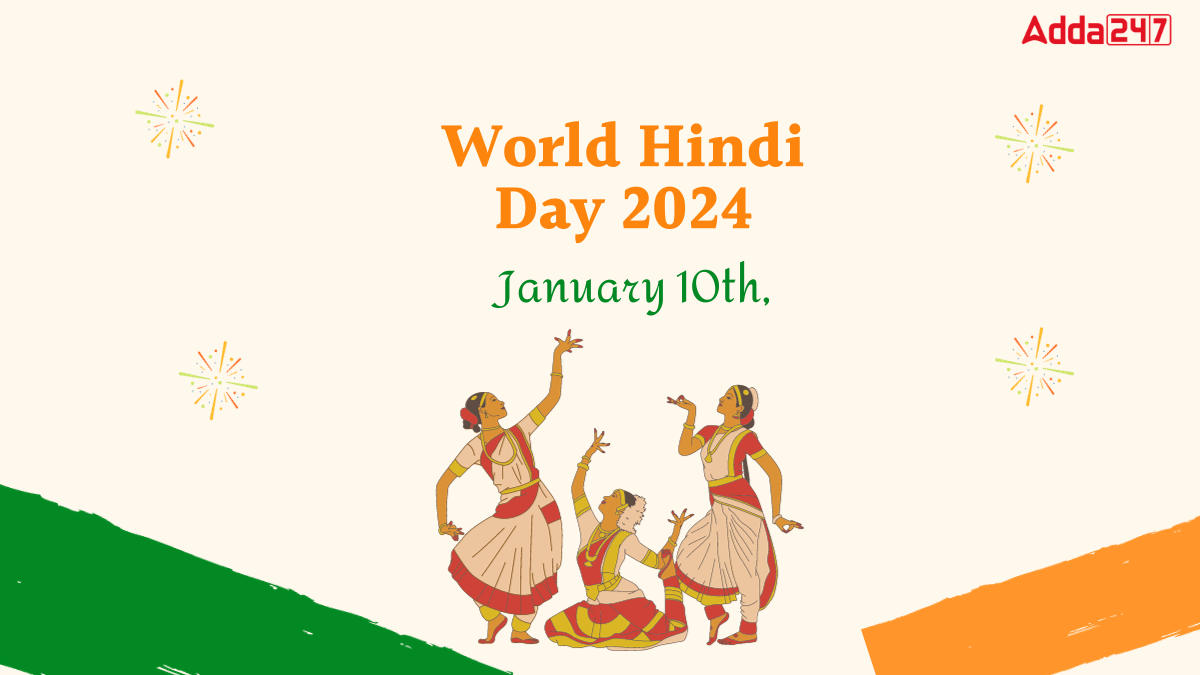Every year on January 10th, the world celebrates World Hindi Day, a day dedicated to recognizing the cultural significance and global influence of the Hindi language. It’s a time to appreciate the richness of this language and its role in connecting diverse communities across the globe.
World Hindi Day 2024, Theme
In 2024, the theme of the World Hindi Day is “Hindi–Bridging Traditional Knowledge and Artificial Intelligence”.
World Hindi Day 2024-A Historic Journey
The journey of Hindi to this global stage began in 1949 with a momentous occasion – its first address at the United Nations General Assembly. This marked a significant step for the language, recognizing its growing importance and influence. Fast forward to 2006, under the leadership of then-Prime Minister Dr Manmohan Singh, the first Vishwa Hindi Diwas was officially observed, marking January 10th as World Hindi Day on the global calendar.
Significance of Hindi Day:
As the official language of the Indian government and one of India’s official languages alongside English, Hindi plays a pivotal role in the country’s cultural landscape. It serves as a vital link between various regions and communities, fostering unity and understanding. Beyond India, Hindi boasts a significant presence in over 20 countries around the world, including Nepal, Mauritius, Fiji, South Africa, and many more. This widespread distribution speaks volumes about its impact on diverse cultures and communities.
Celebrating the Hindi Language:
World Hindi Day serves as a platform to celebrate and promote using Hindi in various spheres. Educational institutions hold events like essay writing competitions, poetry recitals, and plays to highlight the beauty and depth of the language. Cultural performances, music, and theatrical productions showcasing Hindi literature further enrich the day’s festivities. This appreciation helps maintain the vibrancy of the language and encourages its continued growth and evolution.
Interesting Facts about Hindi Day-Did you know?
- 1949: Hindi takes its first steps onto the global stage with its inaugural address at the United Nations General Assembly. This historic moment marks the recognition of Hindi’s growing influence and importance.
- 2006: Under the leadership of then-Prime Minister Dr Manmohan Singh, the first official Vishwa Hindi Diwas is held, solidifying January 10th as World Hindi Day on the global calendar.
- Spoken in over 20 countries: Hindi’s influence extends far beyond India, with significant communities of speakers found in Nepal, Mauritius, Fiji, South Africa, Uganda, Singapore, UAE, and many more.
- Origin of the name: The term “Hindi” itself derives from the Persian word “Hind,” meaning “the land of the Sindhu River.”
- The name “Hindi” itself derives from the Persian word “Hind,” meaning “the land of the Sindhu River.”
- Hindi is spoken by over 600 million people worldwide, making it the third most spoken language globally.
- Bihar was the first Indian state to adopt Hindi as its official language in 1881.
- Literary Hindi, heavily influenced by Sanskrit, uses the Devanagari script and draws its standardized form from the Khari Boli dialect.
- Hindi boasts a highly comprehensive alphabet, capable of representing nearly every possible sound in human speech, surpassing the need for supplemental symbols like those found in English.
- Words like “Swadeshi” and “Aadhaar” have found their way into the Oxford Dictionary, marking the increasing global recognition of Hindi vocabulary.
World Hindi Day is a beautiful reminder of the rich history, vibrant culture, and global reach of the Hindi language. It’s a day to celebrate its contributions to literature, music, art, and everyday communication. By appreciating and promoting Hindi, we not only celebrate a language but also foster cultural understanding and create a more inclusive world.
Important Questions Related to Exams
Q1. In which year did Hindi make its first address at the United Nations General Assembly, marking a significant step for the language’s global recognition?
a) 1956
b) 1949
c) 1962
d) 1980
Q2. Under whose leadership was the first Vishwa Hindi Diwas officially observed, designating January 10th as World Hindi Day on the global calendar?
a) Jawaharlal Nehru
b) Indira Gandhi
c) Rajiv Gandhi
d) Manmohan Singh
Q3. How many countries, other than India, have a significant presence of Hindi speakers according to the passage?
a) 15
b) 20
c) 25
d) 30
Q4. What does the term “Hindi” derive from, according to the passage?
a) Arabic
b) Persian
c) Sanskrit
d) Urdu
Q5. Approximately how many people worldwide speak Hindi, making it the third most spoken language globally?
a) 500 million
b) 600 million
c) 700 million
d) 800 million
Q6. Which Indian state was the first to adopt Hindi as its official language in 1881?
a) Uttar Pradesh
b) Maharashtra
c) Bihar
d) Rajasthan
Q7. What script does Literary Hindi use, as mentioned in the passage?
a) Latin
b) Cyrillic
c) Devanagari
d) Arabic
Q8. What historic moment does the passage highlight regarding the Oxford Dictionary and Hindi vocabulary?
a) Hindi’s inclusion in the Oxford English Dictionary
b) Words like “Swadeshi” and “Aadhaar” making their way into the Oxford Dictionary
c) Hindi becoming the official language of the Oxford University
d) Oxford Dictionary introducing a Hindi edition
Q9. According to the passage, what marked the increasing global recognition of Hindi vocabulary?
a) Hindi being taught in major global universities
b) Hindi movies gaining international acclaim
c) Inclusion of Hindi words in international dictionaries like Oxford
d) Hindi becoming a UN official language
Q10. What is the main purpose of World Hindi Day, as emphasized in the passage?
a) To promote Indian culture globally
b) To celebrate the diversity of languages in the world
c) To appreciate and promote the Hindi language
d) To commemorate the achievements of Hindi-speaking countries
Kindly share your responses in the comment section.



 Kargil Vijay Diwas 2024, Remembering Ind...
Kargil Vijay Diwas 2024, Remembering Ind...
 Important Days in July 2024, Check Natio...
Important Days in July 2024, Check Natio...
 National Brain Research Centre Celebrate...
National Brain Research Centre Celebrate...
